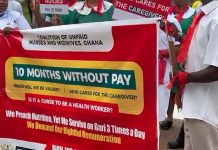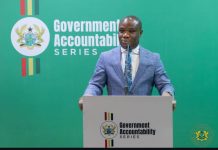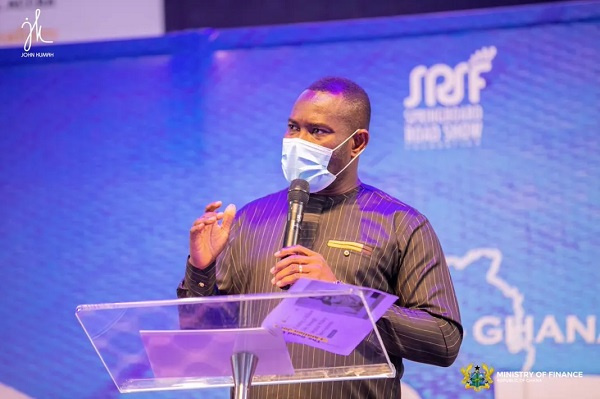Deputy Minister of Finance, John Kumah has suggested that the government may not be able to pay salaries of public sector workers in the long term.
This, he disclosed, will be occasioned by the inability to ramp up domestic revenue mobilization, particularly without the passage of the Electronic Transaction (E-levy) Bill as well as global economic challenges.
Speaking on Accra–based Joy FM, the Ejisu Member of Parliament observed that the raging Russia-Ukraine crisis and the stalled passage of the E-levy will have a rippling effect on the country.
He assured, however, that government will be able to pay the salaries of workers in the immediate interim.
The Deputy Minister of Finance was responding a statement by the Speaker of Parliament, Alban Bagbin, stating that government may not be able to pay salaries in the next three months if something drastic is not done.
“I believe that salaries will be paid. In fact, this year January salary has been paid. February is just about to end, I believe that…at the moment we haven’t seen any challenges of liquidity problems for the government and I believe salaries will be paid.
“But I agree with Speaker when he says that if you look at the world climate and where we are going and the fact that we are still not being able to ramp up revenue measures in the 2022 budget, we could face some serious challenges.
“So let’s all rally together as a people and resolve this problem before it gets out of hand. So the assurance is that salaries will be paid” he said.
Asked whether salaries will be affected in the long run without the E-Levy component and the global economic challenges, John Kumah said “that will be inevitable.”
See below the full transcription of the interview
Evans Mensah: Is the Speaker right that in the next 3 months, workers may not get their salaries?
John Kumah: Well, I wouldn’t say he is right but I will say that I see genuine concern being expressed by Speaker in the wake of government revenue measures not being able to pass as at now and looking at the difficult international climate.
We just saw yesterday that the fuel prices have jumped above $100 on the world market. Russia is attacking and invading Ukraine and it’s affecting the international climate and all these things happening when revenue measures are tight can develop into a difficult situation for us as a country.
So I see a very genuine concern being expressed by the Honorable Speaker to be able to rally the House for us to look beyond partisanship and give higher considerations to our national interest as a people and see how best especially we can all rally around the E-levy and see how we can support government to be able to meet it revenue measures. That’s how I interpret Speaker’s concerns
Evans Mensah: But for workers who heard him, should they have a genuine concern that in the next three months they won’t get their salaries?
John Kumah: Well no. I believe that salaries will be paid. In fact this year January salary has been paid. February is just about to end, I believe that…at the moment we haven’t seen any challenges of liquidity problems for government and I believe salaries will be paid.
But I agree with Speaker when he says that if you look at the world climate and where we are going and the fact that we are still not being able to ramp up revenue measures in the 2022 budget, we could face some serious challenges.
So let’s all rally together as a people and resolve this problem before it gets out of hand. So the assurance is that salaries will be paid…at least not in the foreseeable future as I know[sic].
I don’t know what facts he has. But like I am saying, we are all aware of what is happening globally and so if you are not able to increase your domestic revenue measures and you want to rely on external sources, that’s almost difficult for everybody now.
So let us look at how best we are able to raise internal revenues, especially the measures as introduced in the budget with E-levy among the rest so that we can position government to be able to attend to our expenditure responsibilities
Evans Mensah: In order words, if we don’t get the revenue part sorted which includes [or] one of the avenues is E-levy and with everything that is happening within the global economy…in the long run it could have devasting impact on the economy and the possibility that salaries may be affected in the long run
John Kumah: Well, that will be inevitable. If you don’t raise enough revenues in your economy, it means you will have to go out there and borrow. In fact, if you are borrowing, it means you are not taxing enough.
What it means is that you are looking at external sources to add up to be able to meet your expenditure levels. And so going out there too has all these issues coming up globally.
We just heard the rating agencies and their downgrade of Ghana and all that and then we also know of this global war that is picking up with Russia attacking Ukraine and affecting the oil and energy sector…all these can affect us so I totally agree with Mr. Speaker that it is about time we all look at this issue beyond partisanship.
Let us look at how we can look internally to ramp up our revenue measures and position Ghana in a way that at least our workers can be rest assured that at the end of the month, critical payment can be made…critical payment for critical projects.
You know it’s even just about salaries, our repayment and interest obligations that we have to pay every month is also very critical for as a country. And we are able to do all this when we have revenues measures well received.
So I think it’s a good call and I genuinely support the Speaker’s position that let’s all do something together as a people and look at how best we are able to support government in terms of its revenue measures.
Evans Mensah: The Speaker talks in the short term, he talks about 3 months. You have said that long term if nothing is done, it’s inevitable that salaries maybe one of the things affected. When you say long term, Speaker says 3 months…long term will be how many? What’s the timeline that that will satisfy?
John Kumah: Well, I cannot put a timeline to it but I don’t foresee in the short term like Speaker has put it any difficulty with Ghana at the moment except that like the global environment is going if you cannot look elsewhere for support then you must look internally for that support.
And it is about time that as a people, we began to see our own responsibility in building the country and start changing the language and talking the language of the Republic that what can you and I do to ensure that the programs of government can be achieved such that we don’t have to look elsewhere.
Yes, we welcome external support and external opportunities but beyond that, we must understand that the key obligation to build the country is on us. It’s on our shoulders just like every other country we as citizens must look at how best we support government to raise revenues internally to build this country.
Source: ghanaweb























































![[FREE FREE MONEY] Predict and Win a Guaranteed GH¢200 From Us EVERY WEEK](https://wordpress.ghanatalksradio.com/wp-content/uploads/2022/02/Predict-and-Win-Final-09-03-2021-218x150.jpg)
![[Predict & Win – 8th/Oct.] WIN A Guaranteed ¢200 From Us This Week](https://wordpress.ghanatalksradio.com/wp-content/uploads/2021/10/maxresdefault-16-218x150.jpg)
![[Predict & Win – 2nd] WIN A Guaranteed ¢200 From Us This Week](https://wordpress.ghanatalksradio.com/wp-content/uploads/2021/09/maxresdefault-50-218x150.jpg)
![[Predict & Win – 25th] WIN A Guaranteed ¢200 From Us This Week](https://wordpress.ghanatalksradio.com/wp-content/uploads/2021/09/maxresdefault-36-218x150.jpg)
![[Predict & Win – 18th] WIN A Guaranteed ¢200 From Us This Week](https://wordpress.ghanatalksradio.com/wp-content/uploads/2021/09/maxresdefault-23-218x150.jpg)









![[National cathedral] See full list of churches that have contributed since 2018](https://wordpress.ghanatalksradio.com/wp-content/uploads/2020/09/Ghana-National-Cathedral-GhanaTalksRadio-100x70.jpg)



